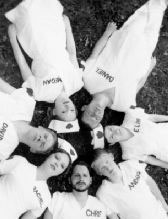There’s no accounting for where inspiration will strike. Like Jesus, another vocal Christian who left a unique stamp on pop culture, New Jersey denizen Daniel C. Smith gets many of his best ideas while working as a carpenter. Typically, he dreams up lyrics and song structures for his eccentric musical ensemble, the Danielson Famile, while toiling away. But one day last year, his thoughts turned to shoes.
“I was putting a roof on a house, daydreaming and wondering why I still have to do carpentry,” recalls Daniel. A longtime fan of Fluevog footwear, the 29-year-old suddenly realized that a shoemaker that gives designs names like Angel and stamps seraphim on its heels, and a band that writes songs of praise like “Can We Camp at Your Feet,” might have something in common. “I got all excited and I e-mailed someone at Fluevog,” he says. To his delight, he learned from the reply that the respect was mutual. Just a few weeks prior, someone in the Fluevog camp had picked up the band’s back catalog, recently reissued by Bloomington, Ind., independent Secretly Canadian, “so everybody there was already excited about us.”
A year later, the e-mail has given rise to a pair of collaborative creations. This week, Fluevog debuts a very limited edition shoe designed specifically for the group—who wear snappy white nurse uniforms on stage—and its admirers. And every pair sold comes with an equally limited edition CD Danielson single, “Flip Flop Flim Flam,” a tune about the spiritual aspect of feet.
“We both wanted to do something on a barter basis, so there’s no money involved,” says Daniel, who helped design the shoe. “We’re just pointing to each other, celebrating each other, and it runs much deeper than the commercial aspect, which is what I like a lot.”
The Familevog is a stunning white slip-on number (inspired, appropriately, by the company’s popular Pope design) emblazoned with gold stitching. On the tongue is a cross, adorned with a symbol familiar to longtime Danielson devotees from the sleeves of the band’s stage costumes: A three-lobed heart, or, as Daniel calls it, the Hart.
“The traditional heart shape originally was a very powerful one, but it’s pretty watered-down at this point,” he explains. “I wanted to bring the human element back to the heart symbol, so it’s not so Hallmark.” So to return the old standard to the realm of the corporeal, he added a prominent aorta. “It’s inspired by some of the very traditional sacred heart-type [images].”
The Familevog is just the latest in an ongoing series of art projects related to the Danielson Famile, which is composed of Smith’s honest-to-goodness siblings David, Megan, Rachel, and Andrew, along with longtime family friend Chris Palladino and his wife Melissa, and Daniel’s wife, Elin. Although the Smith clan grew up singing and making music in the home (their father, Lenny, wrote the hymn “Our God Reigns” and has just released his own album via the family’s Sounds Familyre label), the Danielson Famile first came together as Daniel’s art school thesis project. The cover of the group’s brand new album, Fetch the Compass Kids, is an elaborate quilt, designed by Chris and Daniel, and painstakingly assembled by Elin, Melissa, and Smith family matriarch Marian. “That’s why the album came out a couple months late,” Daniel admits.
Produced by Steve Albini, Fetch the Compass Kids comes closer to capturing the band’s live sound—which has been compared to such disparate originals as the Residents, Sun Ra’s Arkestra, and Captain Beefheart and the Magic Band—than its previous releases: A Prayer for Every Hour (1995), Tell Another Joke at the Ol’ Choppin’ Block (1997), and the two-volume Tri-Danielson!!! (1999). With Daniel’s falsetto yelp at the center of a glorious din of organ, violin, lots of percussion, and even toy piano, the group’s music is startlingly naive, yet impressively crafted. Although first-time listeners may find the Danielson Famile jarring, the lyrical messages of “We Don’t Say Shut Up” and “Rallying the Dominoes,” words of encouragement to take life a little slower, prove surprisingly soothing.
By his own admission, taking things easy doesn’t come naturally to Daniel, but he’s come to appreciate the value of a slower pace—and coming home to his day job at the end of each tour. “When I’m doing something monotonous, like putting siding on a house, I get to let my mind wander,” he reiterates. “And usually the carpenters that I work with are listening to horrible classic rock radio stations, so I’ve had to develop this process where I can zone out when the radio is on. It puts me in a very interesting place, mentally.”






